Items
Tag
essential worker
-
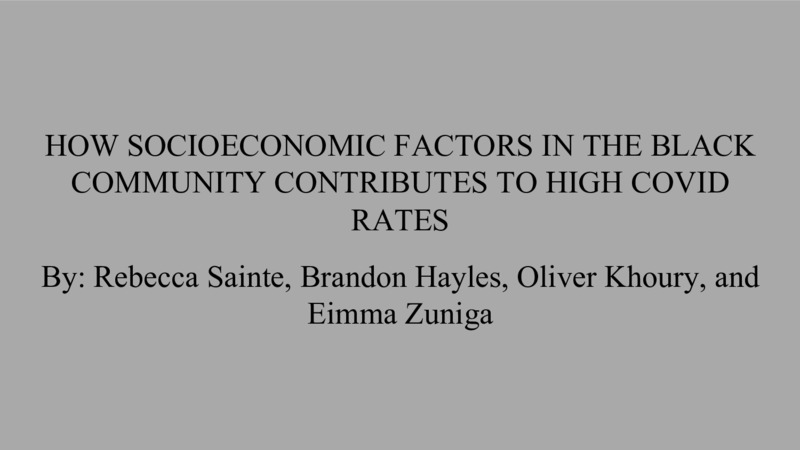 2020-12-14T22:05
2020-12-14T22:05HOW SOCIOECONOMIC FACTORS IN THE BLACK COMMUNITY CONTRIBUTES TO HIGH COVID RATES
We are submitting our group project from class which covers the affects Covid 19 has had on specific communities and groups of people. -
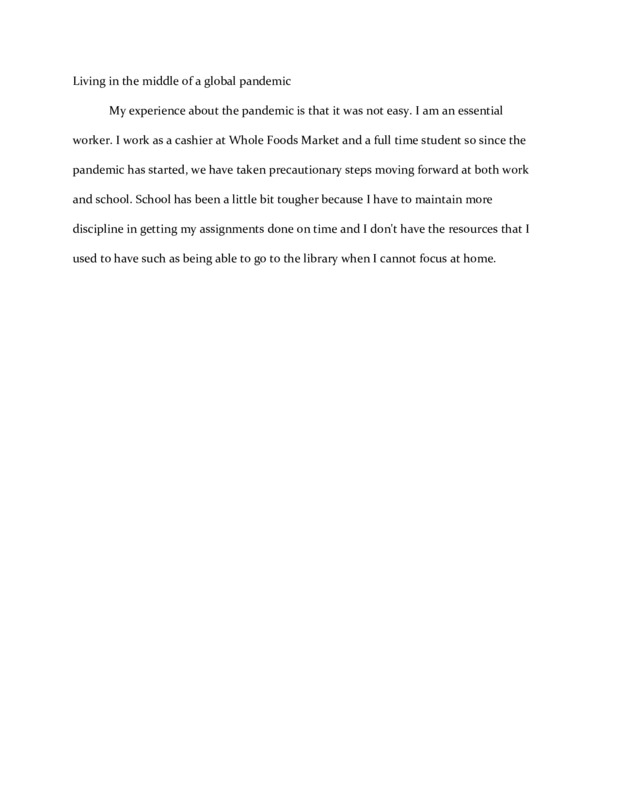 2020-03-10
2020-03-10Living in the middle of a global pandemic
My experience about the pandemic is that it was not easy. I am an essential worker. I work as a cashier at Whole Foods Market and a full time student so since the pandemic has started, we have taken precautionary steps moving forward at both work and school. School has been a little bit tougher because I have to maintain more discipline in getting my assignments done on time and I don't have the resources that I used to have such as being able to go to the library when I cannot focus at home. -
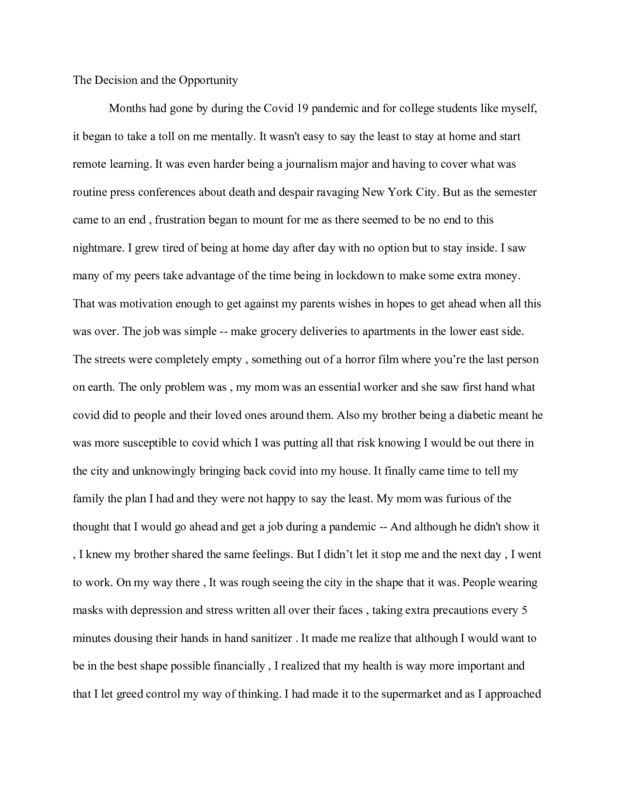 2020-06-01
2020-06-01The Decision and the Opportunity
Months had gone by during the Covid 19 pandemic and for college students like myself, it began to take a toll on me mentally. It wasn't easy to say the least to stay at home and start remote learning. It was even harder being a journalism major and having to cover what was routine press conferences about death and despair ravaging New York City. But as the semester came to an end , frustration began to mount for me as there seemed to be no end to this nightmare. I grew tired of being at home day after day with no option but to stay inside. I saw many of my peers take advantage of the time being in lockdown to make some extra money. That was motivation enough to get against my parents wishes in hopes to get ahead when all this was over. The job was simple -- make grocery deliveries to apartments in the lower east side. The streets were completely empty , something out of a horror film where you’re the last person on earth. The only problem was , my mom was an essential worker and she saw first hand what covid did to people and their loved ones around them. Also my brother being a diabetic meant he was more susceptible to covid which I was putting all that risk knowing I would be out there in the city and unknowingly bringing back covid into my house. It finally came time to tell my family the plan I had and they were not happy to say the least. My mom was furious of the thought that I would go ahead and get a job during a pandemic -- And although he didn't show it , I knew my brother shared the same feelings. But I didn’t let it stop me and the next day , I went to work. On my way there , It was rough seeing the city in the shape that it was. People wearing masks with depression and stress written all over their faces , taking extra precautions every 5 minutes dousing their hands in hand sanitizer . It made me realize that although I would want to be in the best shape possible financially , I realized that my health is way more important and that I let greed control my way of thinking. I had made it to the supermarket and as I approached my supervisor , I told him that I could not put my family at risk for this and that I’m not going to be working. He understood my decision and felt that if I could not do it , then there would be no problem. As I got home , I apologized to my family for potentially putting their health at risk. This pandemic has taught me patience to say the least , there are more important things at the moment than money and sometimes things must take a backseat in order to fully flourish in the future. -
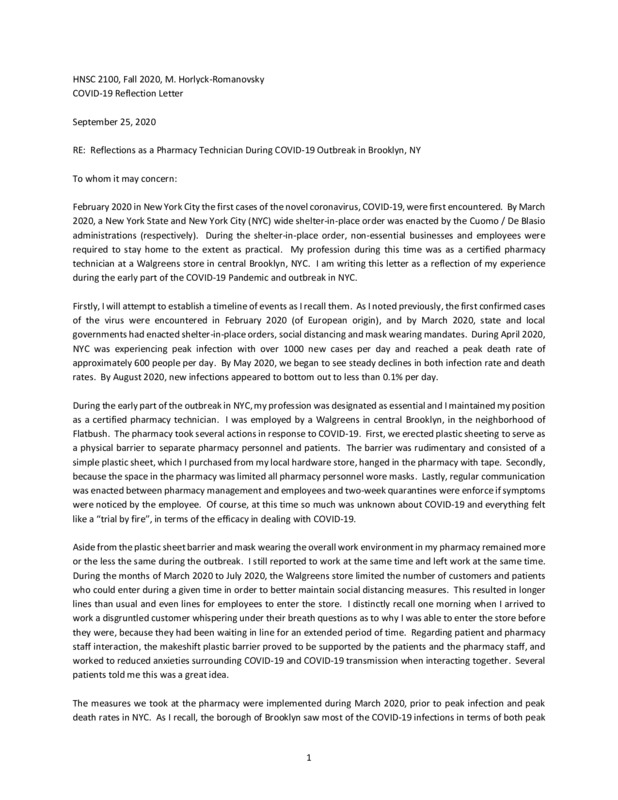 2020-09-25
2020-09-25Reflections on COVID-19 - A Certified Pharmacy Technicians Perspective
A letter written by me to describe my experience with COVID-19 -
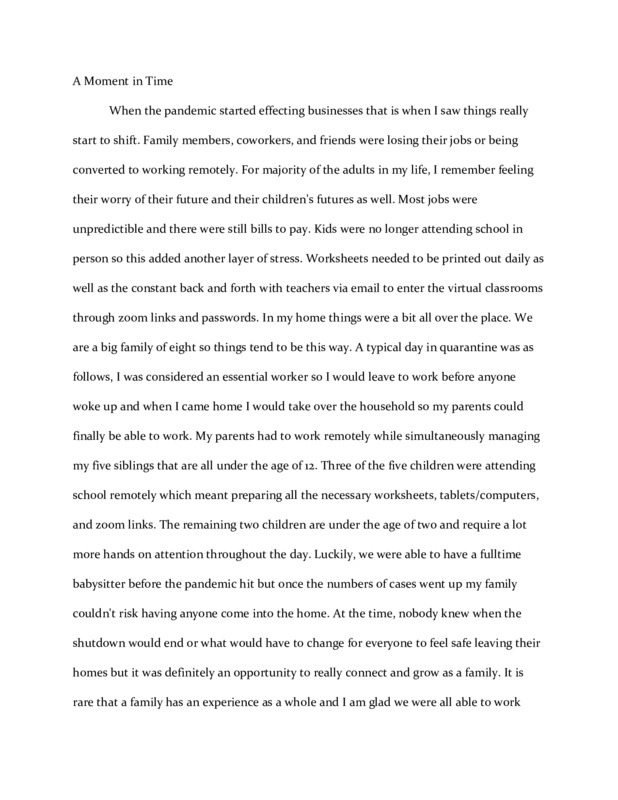 2020-07-07
2020-07-07A Moment in Time
When the pandemic started effecting businesses that is when I saw things really start to shift. Family members, coworkers, and friends were losing their jobs or being converted to working remotely. For majority of the adults in my life, I remember feeling their worry of their future and their children's futures as well. Most jobs were unpredictible and there were still bills to pay. Kids were no longer attending school in person so this added another layer of stress. Worksheets needed to be printed out daily as well as the constant back and forth with teachers via email to enter the virtual classrooms through zoom links and passwords. In my home things were a bit all over the place. We are a big family of eight so things tend to be this way. A typical day in quarantine was as follows, I was considered an essential worker so I would leave to work before anyone woke up and when I came home I would take over the household so my parents could finally be able to work. My parents had to work remotely while simultaneously managing my five siblings that are all under the age of 12. Three of the five children were attending school remotely which meant preparing all the necessary worksheets, tablets/computers, and zoom links. The remaining two children are under the age of two and require a lot more hands on attention throughout the day. Luckily, we were able to have a fulltime babysitter before the pandemic hit but once the numbers of cases went up my family couldn't risk having anyone come into the home. At the time, nobody knew when the shutdown would end or what would have to change for everyone to feel safe leaving their homes but it was definitely an opportunity to really connect and grow as a family. It is rare that a family has an experience as a whole and I am glad we were all able to work together and make the most of this time. Regardless of age, this pandemic has effected us all incredibly and I will definitely look back at this strange time and appreciate the quality time I was able to have with my family. -
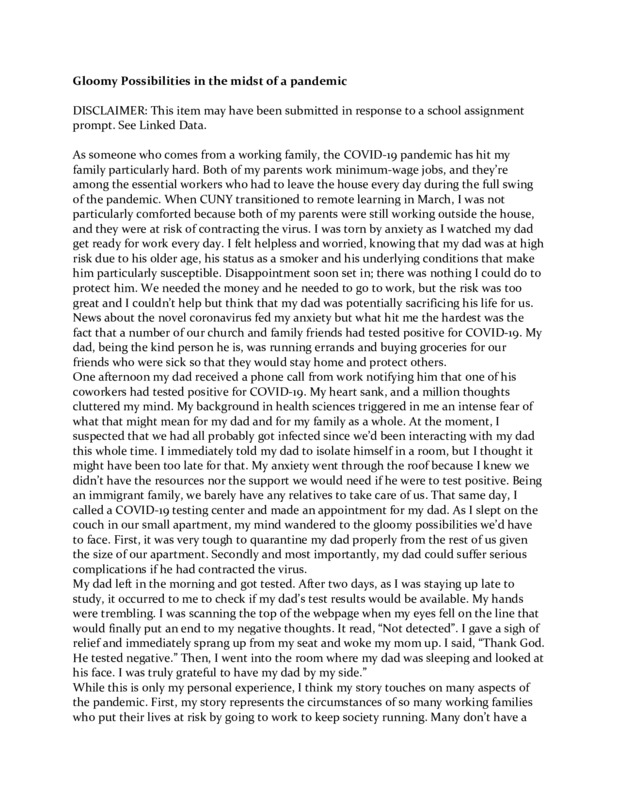 2020-05-20
2020-05-20Gloomy Possibilities in the midst of a pandemic
As someone who comes from a working family, the COVID-19 pandemic has hit my family particularly hard. Both of my parents work minimum-wage jobs, and they’re among the essential workers who had to leave the house every day during the full swing of the pandemic. When CUNY transitioned to remote learning in March, I was not particularly comforted because both of my parents were still working outside the house, and they were at risk of contracting the virus. I was torn by anxiety as I watched my dad get ready for work every day. I felt helpless and worried, knowing that my dad was at high risk due to his older age, his status as a smoker and his underlying conditions that make him particularly susceptible. Disappointment soon set in; there was nothing I could do to protect him. We needed the money and he needed to go to work, but the risk was too great and I couldn’t help but think that my dad was potentially sacrificing his life for us. News about the novel coronavirus fed my anxiety but what hit me the hardest was the fact that a number of our church and family friends had tested positive for COVID-19. My dad, being the kind person he is, was running errands and buying groceries for our friends who were sick so that they would stay home and protect others. One afternoon my dad received a phone call from work notifying him that one of his coworkers had tested positive for COVID-19. My heart sank, and a million thoughts cluttered my mind. My background in health sciences triggered in me an intense fear of what that might mean for my dad and for my family as a whole. At the moment, I suspected that we had all probably got infected since we’d been interacting with my dad this whole time. I immediately told my dad to isolate himself in a room, but I thought it might have been too late for that. My anxiety went through the roof because I knew we didn’t have the resources nor the support we would need if he were to test positive. Being an immigrant family, we barely have any relatives to take care of us. That same day, I called a COVID-19 testing center and made an appointment for my dad. As I slept on the couch in our small apartment, my mind wandered to the gloomy possibilities we’d have to face. First, it was very tough to quarantine my dad properly from the rest of us given the size of our apartment. Secondly and most importantly, my dad could suffer serious complications if he had contracted the virus. My dad left in the morning and got tested. After two days, as I was staying up late to study, it occurred to me to check if my dad’s test results would be available. My hands were trembling. I was scanning the top of the webpage when my eyes fell on the line that would finally put an end to my negative thoughts. It read, “Not detected”. I gave a sigh of relief and immediately sprang up from my seat and woke my mom up. I said, “Thank God. He tested negative.” Then, I went into the room where my dad was sleeping and looked at his face. I was truly grateful to have my dad by my side.” While this is only my personal experience, I think my story touches on many aspects of the pandemic. First, my story represents the circumstances of so many working families who put their lives at risk by going to work to keep society running. Many don’t have a choice but to continue working amidst the dangerous conditions. Here’s the reality, the pandemic has disproportionately affected those with low socioeconomic status either because they’re unable to stay safely at home or because they lack access to healthcare and other resources, which contribute to poorer health status overall. As someone studying health sciences, I’m interested in looking at the association between socioeconomic determinants and health outcomes. The pandemic has shed light on certain inadequacies that we could hopefully remediate in the future. This experience has taught me to appreciate my loved ones more than ever, and it has shown me that we should stand with each other in times of adversity like my dad did with his neighbors. While I was lucky that my family and I were healthy, the panic of a potential loss gave me a taste of what my community has been going through. My heart aches for the families that lost loved ones to the pandemic and particularly for those who had scarce resources to protect and support themselves. -
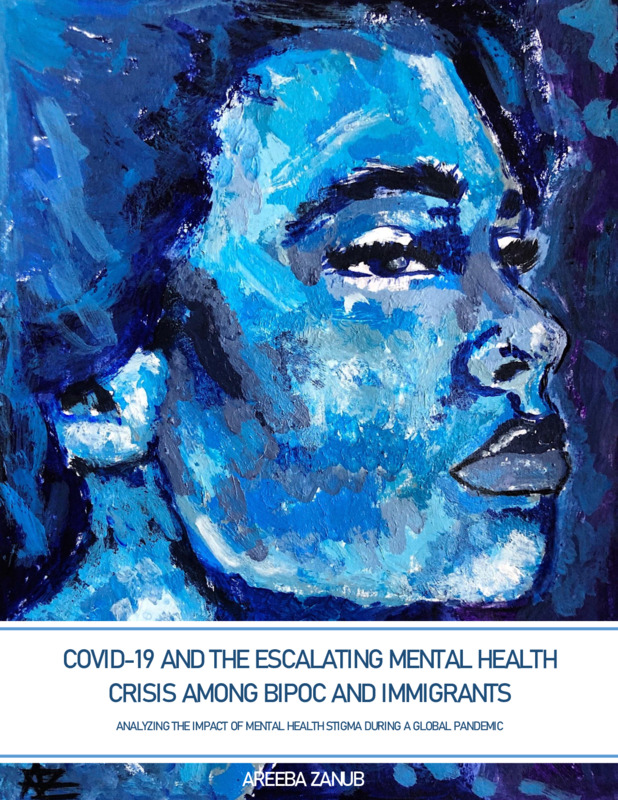 2020-08
2020-08COVID-19 AND THE ESCALATING MENTAL HEALTH CRISIS AMONG BIPOC AND IMMIGRANTS
The purpose of “COVID-19 and the Escalating Mental Health Crisis among BIPOC and Immigrants” is to analyze the already existing socioeconomic conditions in BIPOC and immigrant communities that perpetuate mental health stigma and are also causes for the rising mental health crisis during the COVID-19 pandemic. The research project aims to investigate generational trauma and its correlation to the pressurizing notion of the ‘essential worker,’ how the silence of trauma creates stigma, and the lack of representation and affordable mental health resources for low-income BIPOC and immigrants.
